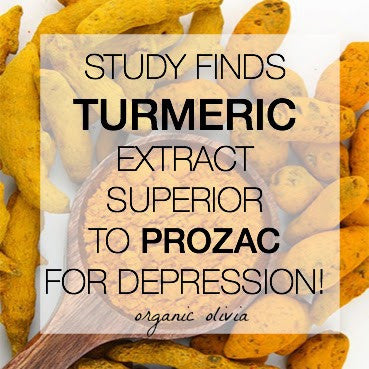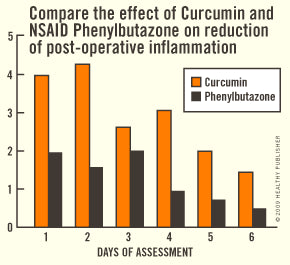
10 Turmeric Benefits That Will Make You Ditch NSAIDs
Turmeric, or curcuma longa is a part of the Ginger (Zingiberaceae) family. This humble little plant has had a dramatic impact on history, starting hundreds of years ago in southern Asia. It was first used as a dye and culinary ingredient in Asian cultures before the Indian traditional medicine, Siddha medicine, began using turmeric benefits as a remedy to many different ailments.
The culinary use of Turmeric spread worldwide over several decades, being used in many traditional dishes such as Thai, Asian, Indian, Persian and Moroccan cuisines. It is especially used in many curries and meat dishes.
Since Turmeric has gone mainstream in the modern western world, research has confirmed the many turmeric benefits. Extracts of the bright orange powder have been shown to have antifungal, antibacterial and anti-tumor properties, as well as cardiovascular benefits, just to name a few.
However, even with the news of Turmeric in the public's eye, many people still use NSAIDs like Ibuprofen which have serious side effects for even short-term use. The FDA recently announced[1] that they are tightening their previous warnings against the popular drugs, millions of people still continue their regular use.

If you're still not sure, we've compiled a list of ten reasons why you should ditch Ibuprofen, or your other NSAID drug, for Turmeric.
1. The FDA has tightened their warnings on the use of NSAIDs.
I know, I know, we just mentioned it, but we can't leave this out of the list either. It's a serious issue, and if we're trusting the FDA to regulate what gets put out on the shelves initially, shouldn't we trust them when they say stop?
2. Turmeric is more effective against depression than anti-depressant drugs.

A clinical trial was done[2] to test whether an active ingredient in Turmeric could be more effective against major depressive disorder. Scientists found that not only is it effective, but it can be effectively used as a replacement. Of course, if you are currently taking medication for depression, talk to your doctor before introducing Turmeric or stopping your prescribed medication.
3. Turmeric is effective against Alzheimer's disease.
Studies have shown[3] that some of the anti-inflammatory properties of Turmeric not only help those suffering with Alzheimer's and other neurodegenerative diseases, but long term use has been seen to start repairing affected brain connections in mice.
4. Turmeric's active compound is effective in the control of Diabetes.
Studies have concluded that Turmeric is effective in controlling diabetes[4], specifically by helping moderation of insulin levels in the blood. It also helps increase the effectiveness of diabetes medications and aids in glucose control.
5. Turmeric has shown anti-carcinogenic benefits.
Some turmeric studies[5] have shown turmeric benefits may, in some cases be able to slow and possibly stop existing growth of cancer cells, but has even destroyed cancer cells in some subjects. The active compounds found in Turmeric are an excellent preventative when it comes to radiation-induced tumors. Some studies have shown it to have a preventative effect against leukemia, colon, and breast cancer cells. *We are in no way saying that turmeric is a treatment for any type of cancer.
6. The anti-inflammatory properties of Turmeric ease Arthritis pains.

The anti-inflammatory properties of Turmeric have been studied and shown to ease Arthritis pains for either osteoarthritis or rheumatoid arthritis. Patients who suffer from moderate to mild joint paints and joint inflammation experience high levels of relief when they used Turmeric regularly.
7. Turmeric reduces your risk of heart disease.
Studies have shown that Turmeric is responsible for reducing the risk of heart disease[6] and other cardiovascular diseases. This is especially good news for people who are at higher risk for heart problems. Luckily, you can season foods with Turmeric and it tastes delicious. Many curries are made with the spice.
8. Turmeric helps heal wounds.
Scientists have conducted studies showing Turmeric actually helps heal topical wounds[7]. Turmeric has antiseptic and antibacterial properties that help clean the wound. Not only that, but sprinkling the power over your wound will slowly repair damaged skin and wound contraction. In other words, the rate that your skin heals will speed up.
9. Boost your immune system with Turmeric.
The active components of Turmeric that are responsible for its antiviral and antifungal properties[8] help stimulate and strengthen your immune system. This not only helps prevent colds, but also helps you recover if you do catch one. Lots of people report shortened colds by drinking a daily glass of warm milk with one teaspoon of Turmeric powder mixed in.
10. Indigestion and heartburn relief
Turmeric provides relief for those who suffer from indigestion or heartburn[9], and there's even preclinical studies that Turmeric can benefit people who suffer from GERD or Crohn's disease. For regular digestive issues, it is suggested to take a teaspoon of Turmeric mixed into a warm glass of milk, just as you would with the flu.
Overall, we are still discovering Turmeric benefits and will be for years. India had the right idea to declare it as a medicine decades ago. These ten highlights only begin to cover what's possible with this amazing spice.
Keep in mind that some people may be allergic to Turmeric, especially if they've shown allergies in the past to ginger or other members of the Zingiberaceae family. As always, it's important to consult your doctor before you try taking Turmeric in addition to, or in place of any medication. Turmeric and other herbal supplements can still cause interactions with several prescription and non-prescription drugs alike.
Sources:
1 - http://www.fda.gov/ForConsumers/ConsumerUpdates/ucm453610.htm
2 - https://www.ncbi.nlm.nih.gov/pubmed/23832433
3 - https://www.ncbi.nlm.nih.gov/pmc/articles/PMC2781139/
4 - https://www.ncbi.nlm.nih.gov/pmc/articles/PMC3857752/
5 - https://www.ncbi.nlm.nih.gov/pmc/articles/PMC2758121/
6 - https://www.ncbi.nlm.nih.gov/pubmed/19233493
7 - https://www.ncbi.nlm.nih.gov/pubmed/25200875
8 - https://www.ncbi.nlm.nih.gov/pubmed/17211725
9 - https://www.ncbi.nlm.nih.gov/pmc/articles/PMC3882399/
